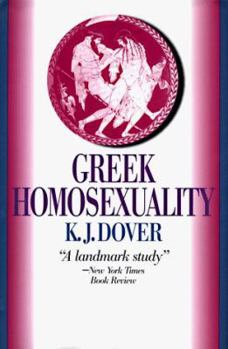Greek Homosexuality
Select Format
Select Condition 
Book Overview
To what extent and in what ways was homosexuality approved by the ancient Greeks? An eminent classicist examines the evidence--vase paintings, archaic and classical poetry, the dialogues of Plato,... This description may be from another edition of this product.
Format:Hardcover
Language:English
ISBN:1567312217
ISBN13:9781567312218
Release Date:January 1989
Publisher:MJF Books
Length:246 Pages
Weight:1.50 lbs.
Dimensions:0.9" x 6.3" x 9.4"
Customer Reviews
5 ratings
out of the academic closet
Published by Thriftbooks.com User , 14 years ago
At last, a wonderfully honest, open, open-hearted, and sound scholarly treatment of Greek homosexuality, a text that is likely to rewrite much of the scholarship that has shied away from this subject in the past. Congratulations!
The Original History of Man-Boy Relations in Antiquity
Published by Thriftbooks.com User , 19 years ago
When one considers that male-male relations had their dominant Western etiology in Greece antiquity, it's only natural to look back to the ancient records and artefacts to illustrate and examine how these relations existed in their antique form. What we see is probably different from what we expect. First, it's important to distinguish "homosexuality" from its practice in antiquity to what it is today. In Greek culture several centuries before Christ, homosexuality as we know it today did not exist, except in Sparta. While Dover does not make this as explicit as he could, one cannot read the extensive material Dover covers without forming this conclusion. In Greek antiquity, the relationships were more oriented toward man-boy relations rather than man-man relations. Identifying these man-boy relations as "homosexual" is certainly tendentious, at best. Second, the "mentoring" that older men functioned for their younger devotees in exchange for the devotee's sexual favors is in stark contrast to anything "homosexual" in our own age. Indeed, today we more likely to lock the older man up in prison for paedophilia, rather than extol him for his service of introducing younger boys to upper Greek society. The cultural context of Athens is anything but homosexual, but truly something else. Third, the ubiquity of the man-boy pattern (primarily around Athens) as opposed to the man-man pattern (primarily around Sparta) illustrates another distinguishing form of "homosexuality" in antiquity. The historian must go where the artefacts are, and the artefacts are not from Sparta, but from Athens, where the man-boy paradigm prevailed. The book's title might have been more appropriately been retitled "Athen's Paedophilia" rather than "Greek Homosexuality." Dover's account is both exhaustive and replete. His historian's viewpoint reports the facts and artefacts dispassionately as his discipline allows, but it might seem to many a bit too confining now that other histories have subsequently appeared. (For an excellent history of homosexuality over the ages, I heartily recommend Crompton's "Homosexuality & Civilization" by Harvard University Press.) If one's purpose is a limited understanding of sexual mores as it was practice in Athen's antiquity, then this book certainly achieves that goal. However, this book really isn't a "gay" or true "homosexual" history at all. It's only by a stretch of definition that man-boy sexual and social enculturation in Greek antiquity really reflects any "homosexuality." If this limited scope is your interest, then this is really the best book of its kind. But if your interest is more broadly "homosexual," then Crompton's book is the one to turn to.
The social uses of homosexual pursuit
Published by Thriftbooks.com User , 24 years ago
What I found particularly informative was Dover's fascinating theory on the social use of Homosexual pursuit among the citizen class. Particularly the information that hubris was a crime in democratic Athens. What has this to do with homosexuality, you ask? the first half of the book explains. Ancient greek homosexuality in no way resembles the modern version and it is mind-blowing to see how they differ and how analogous structures, in two different societies, may seem to be opposites. For instance, in speaking of homosexual pursuit Dover is constantly forced, when comparing Ancient Athenian society to modern, to use heterosexual pursuit as an analogy for homosexual pursuit. The resemblances between modern heterosexuality and ancient homosexuality are just that strong!
Well researched
Published by Thriftbooks.com User , 25 years ago
Dover explores both the role of homosexuality in society as well as personal lives. His research is well laid out and provided an informed view of this subject. While the writing tends to be slightly more academic than I would like, I do not think this could be helped considering the subject matter and the (sometimes) positive views expressed by the author.
Thoughtful and informative.
Published by Thriftbooks.com User , 26 years ago
An excellent, extremely thorough study of homosexuality in Ancient Greece. Dover distinguishes between actual gays, gigolos, and heterosexuals who behave as if they are gay. The author provides mounds of thoroughly critiqued evidence to support every point, as well as candidly admitting to errors in past editions of the book--and correcting them. Yes, it's a history book, but it's also incredibly fascinating. The style is very readable, and the text is approachable by the layman as well as by the scholar. I couldn't put it down. Excellent work!





